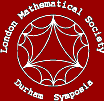Outline
Research themes
The meeting will be based around three main themes:
- Optimization;
- Saddle-point systems;
- Eigenvalues and model reduction.
A brief description of each of these themes is given below. As
indicated in the title, it is the consideration of these
closely-related themes in the important context of partial
differential equations problems which will be the focus of the
proposed symposium.
In almost all formulations, constrained optimization problems give
rise to so-called saddle-point systems in linear algebra. Note that
even though the mathematics is the same, the nomenclature used is
often different in the two areas: saddle-point systems are widely
called KKT systems in optimization, since they derive from expression
of the Karush-Kuhn-Tucker conditions for optimality.
For very large scale systems, iterative methods and preconditioning
become key components in solution strategies. Furthermore, because
most saddle-point problems are symmetric, issues regarding the speed
of iterative convergence are usually expressed in terms of
eigenvalues.
Within each theme, we have identified two international experts (one
from a PDE background and one an expert in linear algebra) who will
each present a series of three keynote one-hour lectures. We have
been especially careful to suggest participants with research
interests which span the linear algebra/PDE boundary. Clearly, the
themes are very closely related and most of the participants will be
interested in more than one of the topics: this will ensure that the
symposium does not degenerate into three mini-conferences.
Optimization
The keynote speakers on this topic will be Max Gunzburger (Florida
State) and Eldad Haber (Emory). As mentioned above, there is an
ongoing conjoining of PDE simulation and optimization to enable
design calculations.
Many different methods and much excellent
software already exists for numerical optimization, however, in the
context of large scale problems coming from PDE applications in which
matrix factorisation (even sparse factorisations) are not conceivable
because of memory and time complexity considerations, a re-evaluation
of appropriate approaches is underway. Ideas such as multigrid, which
emanated in the context of solving "forward" PDE problems, are now
being considered in the context of optimization by Haber and
others. Model reduction provides an alternative approach to generating
cost-effective methods, and Gunzburger is a leading expert in this
area. From the PDE side, problems of flow control and the like have
until recently been considered with simple descent
algorithms. However, the real need to combine knowledge from both
optimization and PDEs for devising general and effective approaches is
now appreciated and this workshop should provide the ideal
circumstances for the strong UK communities in these two subjects to
learn about and build upon what has been done in this area to date
(mostly in Austria, Germany and the USA).
Overall, this research field is very fertile and there are
important unanswered questions regarding the best approaches to adopt.
Saddle-point systems
The two keynote speakers on this topic will be
Valeria Simoncini (Bologna) and Ragnar Winther (Oslo).
There has been a huge resurgence in research interest in this topic within
the linear algebra community over the last decade. This is driven by the
increasing need to solve problems expressed in terms of equilibria with
constraints (in for example optimization, contact problems, computer
graphics etc.).
In the area of sparse direct methods, there have been new methods and
software from, for example, the Rutherford Appleton group, and for
even larger scale problems, new preconditioned iterative approaches
which are specifically designed for the saddle-point structure have
come from several research groups worldwide. Successful techniques
for specific saddle-point problems (such as the incompressible
Navier-Stokes equations) are available through the work of the
proposers and others but many other important problems have still to
be tackled. Particularly attractive from the optimization stand-point
are methods which mimic geometric considerations: for example, the
class of "constraint preconditioners" which ensure iterates remain
on the constraint manifold, thus preserving feasibility, throughout
an iteration process (and not just at convergence).
All standard approaches to PDE optimization lead to saddle-point
systems, so there is a close link with the theme above.
Eigenvalues and model reduction
The two keynote speakers on this topic will be Volker Mehrmann (Berlin) and
Alastair Spence (Bath).
The aim of model reduction is to provide lower-order models that
contain the dominant effects of the original system and lead to reliable
results when used in their place. There is a tight connection with
numerical linear algebra since state-of-the-art techniques are
typically based on Krylov subspace methods.
Mehrmann is one of the leading experts in
the linear algebra aspects of model reduction. An important
aspect of this is the calculation of dominant eigenvalues and
singular values.
A completely different but very important application of eigenvalues is
that of determining PDE stability, for example, sensitivity analysis
of flows. Such problems are becoming increasingly tractable using
shifted Arnoldi methods because of the advent of effective
preconditioners coupled with the increase in available computing power.
Spence is at the forefront of developments in this area.
Eigenvalues are also a vital component of PDE optimization since
nonlinear and linearized
stabilty of computed states does not simply follow from their optimality.
This theme of eigenvalues also underlies the analysis of
the iteration methods used for solving the saddle-point systems in the
second theme above.
|

